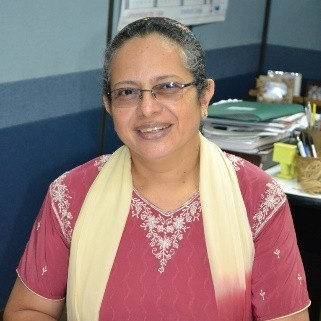A professor at the Universidad del Valle (Univalle) in Cali, Colombia, has spent decades researching and developing projects that help communities gain access to safe drinking water in Valle del Cauca, Colombia and around the world.
In 2020, only 74% of the world's population had access to safely managed drinking water, according to a report by the World Health Organization (WHO).
Professor Inés Restrepo Tarquino, recently retired and outgoing coordinator of the Cinara Institute's Environmental Sanitation Research Group, explained that together with national and international collaborators, she helped facilitate an exchange of knowledge between academia and rural, indigenous and Afro-descendant communities.
"In many communities in Colombia, Cinara Institute has been working with them for more than 30 years," Professor Restrepo said.
Photo: The activity with people from the Alliance for Learning in June, which was a tour of the Cauca River in the CVC school boat. Credit: Cinara Institute.The Research
One project in particular, which will be completed by the end of 2023, is helping to promote the water security of populations in the department of Valle del Cauca.
The project built on knowledge acquired in previous phases by research groups from the Universities of Valle del Cauca, Autónoma de Occidente and Pontificia Universidad Javeriana, and the departmental government funded the project for the management and recovery of water sources through the Science, Technology and Innovation Fund of the General Royalties System.
"We are working on wells in dispersed rural areas and treating wastewater from pigs and humans," said Prof Restrepo, adding that the project is being developed in the Guachal (Bolo/Frayle), BRUT-Pescador, Guabas, Yumbo-Arroyohondo and Dagua basins in the department of Valle del Cauca, Colombia.
The researchers are applying prototypes for pollution control and scaling up a model of integrated micro-watershed management by the communities that includes a software package oriented to community organisations, through web-based open source software.
One of the community members directly impacted by the project is Mrs. Ileana Correa from Vereda Tocotá in the municipality of Dagua, where she has a farm where she grows pigs on a small scale.
|
Read more from the Cinara Institute: Colombia's Minister of Mines & Energy opens Latin American Congress on Environmental Conflicts |
Photo: 'Women Greening Industries in Colombia' is an alliance of Colombian women who are helping to transform the country's construction industry from a highly polluting sector to a cleaner, greener business. Credit: Cinara Institute.
International Collaborators
Moreover, the impact of Professor Restrepo's research extends far beyond Colombia's borders.
Fernando Cajas, the director of the Engineering Research Institute at the Centro Universitario de Occidente of the Universidad de San Carlos de Guatemala, , in Quetzaltenango, Guatemala, explained that Professor Restrepo, as a researcher at the Cinara Institute, was instrumental in a collaboration between research institutions in the Netherlands, Colombia and Guatemala.
"She travelled many times here to Guatemala to develop the project and achieve its objectives, among which one stands out, the design of a master's degree in water science and technology, the introduction of the theme of integrated water resources management," said Professor Cajas, adding that Colombia and Guatemala have very similar cultures and made it possible to solve problems of scientific and technological innovation.
"This triangulation allows the capacities that a more advanced country in Latin America already has in place to be transferred in a more direct, simpler and clearer way to countries like Guatemala," said Professor Cajas.
The Cinara Institute has also collaborated with Stef Smits International Water and Sanitation Centre, Delft in the Netherlands, and John Butterworth of the Natural Resources Institute, University of Greenwich, UK.
If you are interested in contacting the researcher or learning more about the project, please write to the Communications Office Faculty of Engineering: comunicaingenieria(at)correounivalle.edu.co
Cover photo: Professor Inés Restrepo Restrepo, recently retired and outgoing coordinator of the Environmental Sanitation Research Group at Instituto Cinara. Credit: Univalle



Comentarios
Publicar un comentario